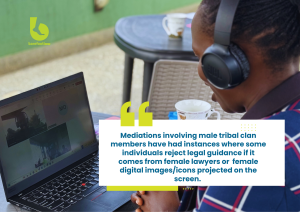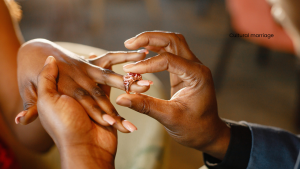In northern Uganda, there exists a custom that many may struggle to understand. There is a customary practice where a man may be obligated to enter into a marriage with a woman after her death, resulting in a posthumous marriage.
Recently we handled a case at the BarefootLaw Box in Paicho where a man who had been living with a woman but had not married her was forced to pay bride price before her burial could take place. The deceased’s body remained open and unburied for almost a week, which led him to sell land belonging to his other wife to raise the necessary funds for the bride price. This case and many others like these expose the stark contrast between customary law and the formal legal system. The latter, governed by statutes and principles of contract, age, precedent, consent, and legal capacity, finds itself at a loss when confronted with a practice that is neither explicitly recognised nor adequately addressed in written law.
A Debt of Honour.
The logic behind posthumous marriage is rooted in obligation and honour. In these communities, when a woman dies without being married, and yet had children with a man, it is considered a disgrace to her dignity and that of her family. The custom of these societies thus dictates that, what was denied to her in life must be given to her in death. The man she was cohabiting with, whether by his own neglect or delay, is made to marry her in a marital union after her death. This act serves to recognise her status, grant legitimacy to the children that she bore, and fulfil the community’s moral and customary expectations.
From their perspective, this practice is a form of justice. It ensures that a woman, even in death, is not left without a place within the lineage of the partner she lived and bore children with. It is a safeguard to her legacy and provides social security for the children left behind.
Where Written Law Falls Silent
The Ugandan legal system, like many countries in Africa, is deeply rooted in colonial legal frameworks. Marriage, within this structure, is an agreement between two living parties (male and female), making the practice of compelling a man to marry a deceased woman legally problematic. Fundamental legal questions arise like who consents to the marriage? What are its legal implications? Can a deceased person enter into an agreement?
The law’s silence on this issue has created a vacuum on the way forward. No written law or court ruling clearly addresses how such a practice should be harmonised with written law. The challenge, therefore, is not to merely to dismiss the practice as bizarre but to critically engage with it in a manner that respects both cultural realities and legal principles.
As such, the question of consent and legal recognition of posthumous marital obligations could be considered in light of legal cases in the broader burial rights jurisprudence. in Namusoke Annet Kiwanuka v. Eva Amuge and Two Others, Miscellaneous Cause No. 4 of 2023, the High Court in Uganda examined how burial rights are intertwined with a deceased person’s wishes. The court stated that the place a person is buried is closely linked to the person’s wishes before they died, the duty imposed on those closely related to the deceased during his lifetime to bury him and finally whether they had established a home. Additionally, the court stated that the custom to which the deceased belonged to must come into consideration in such an instance. Similarly, in SAN v. GW, Civil Appeal No. 01 of 2020 [2020] eKLR, the Court of Appeal emphasised that while the wishes of the deceased are important, they are not binding, as a dead person cannot actively participate in their own burial decisions.
These cases and more, highlight the legal complexities surrounding posthumous obligations and reinforce the principle that customary practices, though influential, must align with the broader legal framework. By drawing from the similarities between burial rights and posthumous marriages, the legal dialogue on these issues could evolve to address the intersection of tradition, customs, consent, and written law. These conversations however should be led by vital questions like can communities redefine the practice to uphold the deceased’s dignity without coercing the living? Can the law offer alternative ways to recognise and honour the deceased without compelling an unwilling man to marry a deceased woman? These are questions that require dialogue and legal innovation with the backdrop of cultural sensitivity.
The Journey Ahead
As Uganda continues to grapple with the intersection of statutory and customary law, we as BarefootLaw intend to remain at the frontline of these conversations. Through our work, we see firsthand that justice appears differently to different people. The challenge is to bridge the gap to recognise the wisdom in custom while ensuring that human rights and legal protections are not undermined in the process.
Posthumous marriages, as unsettling as they may seem to those outside these communities, are a reflection of the broader struggle between formal legislations and tradition. However, rather than dismissing them outright, it is time we asked, how can we shape legal systems that do not just impose rules from above but respond meaningfully to the lived realities of the people they serve?
References
Namusoke Annet Kiwanuka v Eva Amuge and Two Others Misc Cause No 4 of 2023 (Uganda HC).
SAN v GW Civil Appeal No 1 of 2020 [2020] eKLR (Kenya CA).












